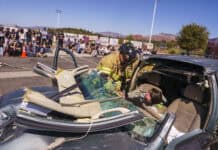Art Babbott is running for Arizona’s House of Representatives, but he is neither a Democrat nor a Republican.
He was elected to the Coconino County Board of Supervisors as an independent, and now he is running for District 6 as one.
“I’m not running as an independent because it’s easier. It’s not by accident. It’s by intention,” Babbott said. “What does not work is what we’re currently doing. The year before last there were about 1,500 bills that made it out of the Arizona legislature to the governor. Less than 1% of those bills came from the [minority] party. I will support good legislation regardless of if it comes from an ‘R’ or comes from a ‘D’ …. We have confused the party of origination [as] being more important than the idea, the solution it is generating or the opportunities.”
Babbott straddles the parties. He describes himself as more of a libertarian on social issues — pro-choice on abortion and in support of Proposition 207, which would legalize recreational marijuana in the state.
On economics, he is more of a fiscal conservative, arguing that because of his history as a county supervisor and small business owner — he is the owner of a farmers market, and former operator of a stage theater — he cares about balanced budgets. But Babbott is not purely in favor of small-government solutions.
“If you want to achieve things, you have got to invest in things,” Babbott said. “We are past the stage in our society and our nation where we get things for free. If we want educational outcomes, we are going to have to invest. If we want broadband in rural Arizona to help manage the … challenge here, we will have to invest.”
Babbott argues that investment in the areas can be paid for through eliminating tax breaks for businesses, saying that the legislature should not be picking winners and losers, and pointed to Proposition 208, which raises education funding through raising taxes on personal income above $250,000 or $500,000 for joint filers as a way forward. He argued that an increase in job skills — he committed to help Yavapai College develop a career and technical school to train in trades — and broadband access would allow for more industrial jobs in the area.
“If we think that our communities are going to be built with vibrant, diverse people in our workforce, we had better have opportunities that are diverse enough to meet the needs of all those people,” Babbott said.
Babbott sees the natural beauty of the area as the “golden goose” of Northern Arizona’s economy and says it needs to be protected, but also sees that as an opportunity for the kinds of high-skill jobs he touts. He points to forest reclamation as a sector that could employ people with good jobs while also improving the economic prospects of tourism.
Babbott believes that a major challenge for the area is in keeping rural health care options — such as the Sedona Emergency Department, which may be downgraded to urgent care by Northern Arizona Healthcare — open to residents, and he believes that the way to do so is by finding ways to keep doctors in rural areas. He expressed support for recent bills from the legislature that encourage medical residents to start in a rural area, increasing the likelihood of them staying there.
“I think broadband and the infrastructure is one of the innovations coming out of COVID that can be good for rural America,” Babbott said.
Babbott criticized the state for its response to COVID-19, arguing that it had not done enough to help small businesses. He suggested that small businesses should have fines waived for late property taxes. As a county supervisor, he encouraged wearing masks to prevent spread.






















